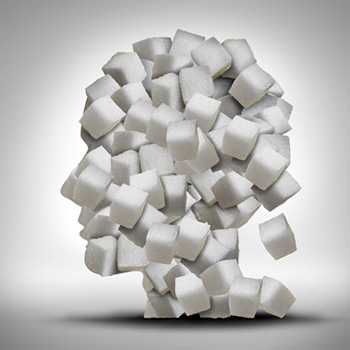 I’ve written about sugar in earlier posts – notably, its effect on our physiology and its addictive power. I got another dose of admonitions against this pervasive component of the American diet when reading Grain Brain: The Surprising Truth About Wheat, Carbs, and Sugar, Your Brain’s Silent Killers by Dr. David Permutter.
I’ve written about sugar in earlier posts – notably, its effect on our physiology and its addictive power. I got another dose of admonitions against this pervasive component of the American diet when reading Grain Brain: The Surprising Truth About Wheat, Carbs, and Sugar, Your Brain’s Silent Killers by Dr. David Permutter.
For most of human history, sugar made rare appearances in the diet. We simply didn’t have access to the raw materials or the technology to refine it. We only consumed a modest amount of fructose and glucose in fresh fruits and vegetables. So our bodies had to develop elaborate mechanisms to convert protein and fat to glucose and release it into the bloodstream.
Insulin provides the means to transport glucose from the bloodstream into muscle, fat, and the liver. Upon arrival, glucose is stored as a readily available source of fuel. However, once cells have their fill, they’ll grow insensitive to further attempts by insulin to “unlock their doors” and deposit additional glucose – a condition known as insulin resistance. Excess glucose molecules remain in the bloodstream and attach themselves to proteins, fats, and amino acids, a process called glycation. Once glycated, proteins don’t do their jobs well. Moreover, glycated proteins have been shown to create a 50-fold increase in free radical formation relative to proteins that are not glycated. Free radicals give rise to inflammation which, among other things, sparks arterial plaque formation. Plaque accumulation gives rise to coronary artery disease (CAD), Alzheimer’s disease, and stroke.
For most of us, excess weight is the only physical manifestation of too much sugar in the diet. We may find it bothersome that our clothes don’t fit as well or that we face the implied criticism from a culture that venerates thin people. But it turns out that when excess fat accumulates in adipose tissue, it’s anything but passive. Visceral fat (around the organs) secretes a large amount of cytokines that trigger inflammatory pathways. The refuse from our bodies’ immune response dumps into the liver. The liver then ups the ante on inflammatory and hormone-disrupting substances.
 If the after-effects of inflammation fail to sound the alarm, perhaps loss of cognitive function might do the trick. Dr. Perlmutter notes that chronically obese individuals have been shown to have 8% less brain tissue than folks of normal weight. Chronically overweight individuals may experience a 4% drop in brain tissue. Much of this tissue loss occurs in the frontal or temporal lobe, the locus of executive decision making.
If the after-effects of inflammation fail to sound the alarm, perhaps loss of cognitive function might do the trick. Dr. Perlmutter notes that chronically obese individuals have been shown to have 8% less brain tissue than folks of normal weight. Chronically overweight individuals may experience a 4% drop in brain tissue. Much of this tissue loss occurs in the frontal or temporal lobe, the locus of executive decision making.
A change in diet lowers the risk of obesity, vascular disease, and inflammation linked to cognitive decline. Avoid foods and beverages responsible for the biggest surges in blood sugar – i.e., anything made with refined flour, starches (rice, potatoes, corn), liquid carbs (e.g., fruit juices, soft drinks), and, of course, added sugar, sugary sauces, and syrups. Get your carbs from whole fruits and vegetables. They’re bound up with insoluble fiber and water which slows fructose and glucose absorption to a rate the body can handle… in moderation.